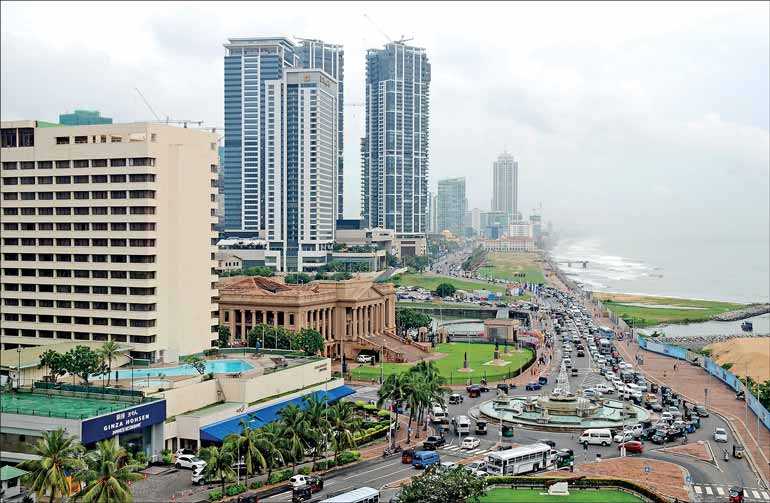Thursday Apr 24, 2025
Thursday Apr 24, 2025
Friday, 9 October 2020 00:00 - - {{hitsCtrl.values.hits}}

The crisis Sri Lanka is facing now cannot be considered a one that has been caused by the pandemic. It is a crisis that has been growing steadily before and the outbreak of the pandemic can be said to have only intensified the volume of the crisis – Pic by Shehan Gunasekara
The crisis Sri Lanka is now facing can be considered as the biggest and the most complex crisis the country has ever faced since independence. 
It is not confined only to the economy of the country, but has overwhelmed the entire socio-political system. Yet, the Government hardly talks about it. Even the Opposition is silent about it.
Ignoring the crisis
What could be the consequences of this crisis Sri Lanka is facing? What could be the end of foreign debt crisis? How many people will lose their jobs? What is the policy to be adopted with regard to them? How many business enterprises have already been closed and how many more are due to be closed?
Is there a policy to be followed regarding them?
What is the extent of damage caused by the collapse of main sources of foreign exchange earnings? How can the damage done to the economy be overcome? What is the nature and extent of the impact the policy of slashing imports is likely to have on the economy?
How does the Government expect to bridge the enormous and unfavourable gap between its revenue and expenditure? What is the nature and extent of the impact that the prevailing economic crisis will have on the socio-political system of the country which is also in a state of serious crisis?
The crisis Sri Lanka is facing now cannot be considered a one that has been caused by the pandemic. It is a crisis that has been growing steadily before and the outbreak of the pandemic can be said to have only intensified the volume of the crisis.
The decline of the social system
The decline of the social system was not a phenomenon that remained imperceptible or less noticed; it was visible and conspicuous. Whatever may be the possibility of building the Sri Lankan nation, our national leaders have failed to realise that preserving internal unity among different communities is an essential condition for the progress of the country.
Yet, they have continued to follow an unscrupulous policy that has enhanced divisions among different communities, with the view to gaining political advantage rather than preventing and discouraging development of divisions based on ethnic, caste and religious differences, and managing them in an optimal manner.
This situation has aggravated divisions in society and turned them into protracted violent conflicts, which eventually led to large-scale destruction of lives and property. The uprisings first arose not among the minorities but from within the majority community itself.
The uprisings that broke out from among the Sinhala and Tamil youths could be considered as situations that should have been defeated and suppressed. But, the policies adopted in respect of the victims following the suppression of insurrections cannot be said to have been at an optimal level.
If the Sri Lankan State had been wise and possessed the ability to look ahead, those insurrections should have been defeated long before they actually burst out. If, however, the Government did not have such a far-reaching vision it still should have suppressed them immediately, at the very outset when they broke out, without letting them escalate further.
It was only the 1971 uprising that the State was able to suppress promptly. It took nearly two-and-a-half years to defeat the second rebellion launched by the JVP. It was defeated only after it had gained considerable momentum and developed into a maximum level. It took more than 30 years to suppress the insurgency launched by the LTTE.
The consequences of riots
Just as the rebels caused heavy loss of lives, the Government too was compelled to destroy a large number of lives to suppress the two insurrections. It served as a strong factor in weakening the public acceptance of the Government.
The conquest of rebellions was not an achievement secured without the winners themselves sustaining huge damage. The rebels too, have inflicted serious injuries and damages on the winner, the State thereby debilitating the winner as well.
On the other hand, the failure of the State, after the suppression of the insurrections, to realise the fact that it had defeated only two citizen groups of its own people and not two invading foreign armies and implement a policy to investigate into the grievances of disgruntled youth that caused the insurrections and to provide relief to the victims invariably led to weakening public acceptance of the State and gave it an appearance of a ruthless carnivore.
These violent conflicts invariably resulted in disrupting and distorting the socio-political system and also weakening it. The impact they had on the economy was exceedingly devastating.
Since independence, Sri Lanka has not pursued a cohesive and wise policy to effectively develop the assets and resources of the country. Instead, it has followed an imprudent and dim-witted policy from time to time, which has destroyed them en masse.
The total damage to the country’s economy caused by various ways over the past 60 years due to internal conflicts alone could be as high as two to three hundred billion dollars.
The decline of the political system
At the time of independence, the country had received a fully fledged Westminster-style parliamentary system of governance.But our leaders did not possess the democratic awareness or discipline needed to operate and maintain such an advanced system of governance successfully.
The foremost aim of the first Republican Constitution of 1972 was to do away with the binding obligations to the British Crown and was enacted in such a way that the powers of the Judiciary and the Executive were diminished and Parliament would gain an overriding power over the above two institutions.
Then, in 1978, a presidential system which stood above the law was established by the second Republican Constitution, further weakening and distorting the democratic basis of the system of governance that prevailed upto then.
The President, in addition to having all the powers of the State concentrated in him and also enjoying the power to be above the law, created an despicable system that allowed himself, his Ministers and ruling party MPs to misappropriate public property which was in their temporary custody.
It also allowed them to take over or transfer certain State property at their discretion, and in addition, a system was created so that they could transact business with the Government, contravening the law.
This unlawful and corrupt system introduced by President Jayewardene was protected and pursued by successive presidents by adding new elements to it. This practice of plundering public property did not stop at becoming a regular feature of the State administration and continued to rot the State and its entire system of institutions by corruption.
The decline of the economy
Consequent to the plundering of public property becoming a regular feature of State administration, a new system was established in which the importance given to the initiatives of general economic development of the country was diminished and priority was given to programs that allowed the ruling party and their cronies to make ill-gotten wealth.
The institutions that collect taxes for the Government are in an extremely corrupt state. The income they collect for the Government may be as less as 30% of the actual revenue they should collect. The rest is probably drained into the pockets of the corrupt politicians and bureaucrats.
It is the politicians who have acquired the major portion of State businesses (such as telecommunications, alcohol, transportation, timber, rubble and sand, and re-export licenses) which are operated under Government licenses. Consequently the Treasury does not receive more than 10% of the revenue it should earn through these channels.
The development projects being implemented on foreign loans have become a major source of ill-gotten gains for politicians. There is a big gap between the actual cost and the price paid for these projects. If the price quoted by the foreign contractor is Rs. 100, the price paid to him may be as high as Rs. 200 or Rs.250. The borrowing of foreign loans is done to match this artificial price.
In this backdrop, there is a system in place where the foreign contracting company will retain the 100 which is its due and distribute the balance among politicians, their cronies and officials involved in the transaction. It is this huge difference between the actual cost of most of the projects implemented on foreign loans and the inflated price paid for them that has made the balance of payments of Sri Lanka an insurmountable crisis.
In terms of economy, the sum total of these malpractices has pushed Sri Lanka to the verge of complete bankruptcy.
The solution in brief
Overcoming this crisis Sri Lanka is facing cannot be considered a matter which is simple or easy. The attempts to solve it can be successful only if it is based on a strong collective effort and a wise and pragmatic approach aimed at uniting the fragmented nation.
The country must be directed towards making structural reforms that will formally block the ruling party from looting public property when it is under their temporary custody, and establish a sound system of governance based on a truly democratic foundation.
Otherwise, adopting the 20th Amendment which can be considered dictatorial or defending the 19th Amendment will not be a solution to the real crisis facing the country. Under the circumstances, the best democratic path that can be chosen to lead the country towards a real structural reforms program would be to direct the public towards adopting a ‘People’s Constitution’ for the country.
Discover Kapruka, the leading online shopping platform in Sri Lanka, where you can conveniently send Gifts and Flowers to your loved ones for any event including Valentine ’s Day. Explore a wide range of popular Shopping Categories on Kapruka, including Toys, Groceries, Electronics, Birthday Cakes, Fruits, Chocolates, Flower Bouquets, Clothing, Watches, Lingerie, Gift Sets and Jewellery. Also if you’re interested in selling with Kapruka, Partner Central by Kapruka is the best solution to start with. Moreover, through Kapruka Global Shop, you can also enjoy the convenience of purchasing products from renowned platforms like Amazon and eBay and have them delivered to Sri Lanka.
Discover Kapruka, the leading online shopping platform in Sri Lanka, where you can conveniently send Gifts and Flowers to your loved ones for any event including Valentine ’s Day. Explore a wide range of popular Shopping Categories on Kapruka, including Toys, Groceries, Electronics, Birthday Cakes, Fruits, Chocolates, Flower Bouquets, Clothing, Watches, Lingerie, Gift Sets and Jewellery. Also if you’re interested in selling with Kapruka, Partner Central by Kapruka is the best solution to start with. Moreover, through Kapruka Global Shop, you can also enjoy the convenience of purchasing products from renowned platforms like Amazon and eBay and have them delivered to Sri Lanka.